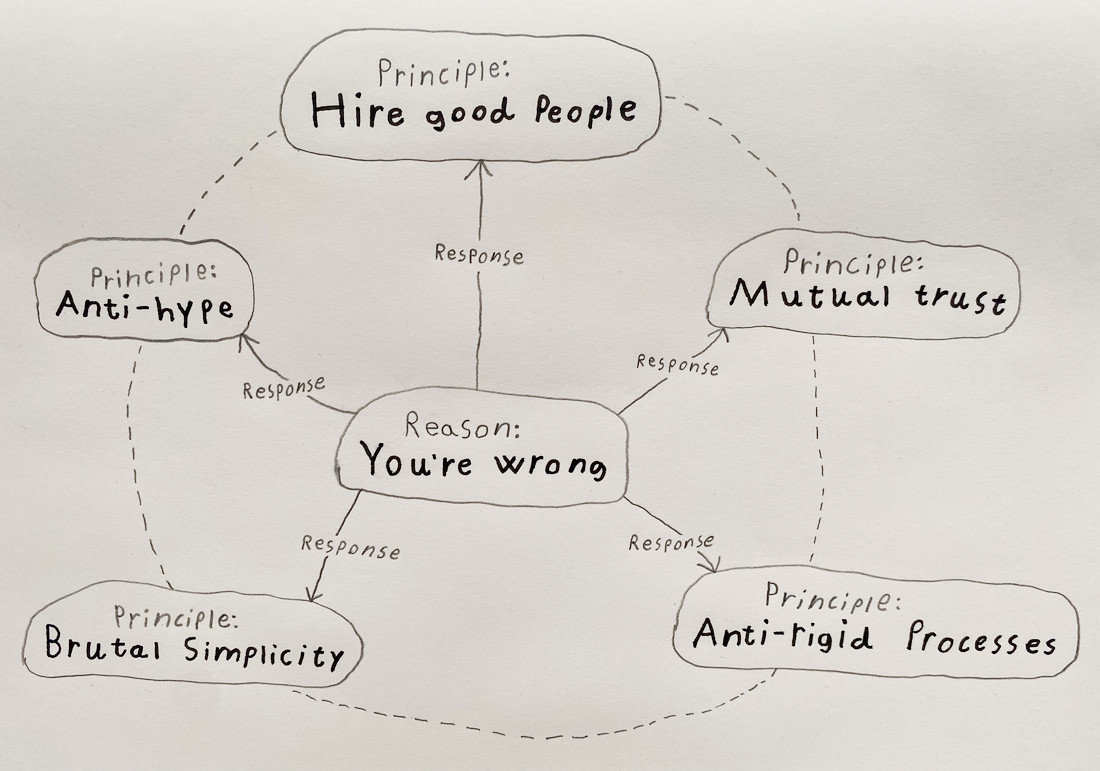Thoughts on How I Would Run a Startup
2024-08-13 Carl Riis
This is a post I’ve thought could be fun to write for some time. It’s my personal thoughts on how I would run a small startup.
I started my career working for startups but have since made the move to work in the public sector.
I don’t have a planned escape, and I’m very satisfied where I am, but part of me imagines starting and running a company one day.
I think now is a perfect time to flush out my thoughts because no part of me is looking to implement any of them. I can brainstorm with no consequences.
I might iterate on this later in life. I imagine writing multiple versions of this document as I gain experience and my opinions change. This is the first version.
Intro
When I started this post, I set out to make a practical guide detailing the different steps I’d take. This turned out to be difficult, considering I don’t have any direct experience running a company.
Instead of a plan, I wrote up some general principles and ideas. I hope these show the things I’d value and how I’d approach problem solving.
I drew up this graph to illustrate what I’ll cover:

As you can see, everything stems from the thinking that “You’re wrong”: my belief that problems arise from confidence in your own correctness. Some people might consider this a bit skittish, but I think it’s possible to boldly solve problems with healthy fear that you’re probably wrong.
I tried to write this with a small company in mind (3-5 people-ish)[1], where everyone has relatively equal influence.
I should note that this is very opinionated.
Hiring good people
The people you work with have many magnitudes more importance than anything else I’ll cover. You need to team up with amazing people.
I don’t have experience with hiring and can’t speak to it.
Mutual trust
In order for good people to work their best, they need freedom and autonomy. They need trust from others that they’re contributing without scrutiny.[2]
If you can’t trust them, you’ve already started working with the wrong people.
Be constantly open to others’ ideas being better than yours. Giving up your own idea if someone else has a better one only benefits you.
Everyone should feel comfortable sharing their real opinions, especially when they go against the consensus. Losing someone’s trust means they’ll stop being honest with you, cutting you off from valuable ideas and information.
You’re wrong
To get to something right, you often have to go through multiple layers of wrongness.
Remembering this will, hopefully, drive you to dig deeper and question your decisions more often.
People are too trusting of their intuition and too eager to marry their ideas.[3]
You should have a healthy amount of paranoia that you’re wrong, all the time.
Anti-hype
Hype is dangerous. It’s an effective tool to gaslight you and your team.
When you’re hyped, it becomes harder to make rational decisions.
It’s a tempting feeling to spark because it numbs your capacity to judge wrongness.[3]
Hype should be held at a safe distance, experienced as an emotion to conclusive results, not deployed as motivation to rally ideas.
Anti-rigid processes
A process for work might look like this: Every X amount of time, figure out what to do through a series of steps and methods. Save the result. For the rest of the period, work through units of the result while keeping track of everything in a certain way. Repeat.
Formulating what to do shouldn’t be a fixed multi-step process. Each step distances you from your original aim. Moreover, wrongness in individual steps multiplies the overall inaccuracy.
Deciding on actions shouldn’t be tied to a schedule. It’s not a shortcut to batch your thinking up front. A rigid planning system creates a false sense of efficiency while limiting flexible decision-making.
But without a process, how do you keep track of what to do? You don’t. Think and talk together.
You know what to do.
Keep a loose list if necessary to help your memory, but don’t give it any authority over decisions. You know best, now.
Process is necessary if you’re many people, but is often resorted to immediately. If you can keep things fluent, you should.
Brutal simplicity
Simplicity is something you should have in everything you do. It means sacrificing the number of things you can prioritize at once, but what you gain is worth it.
Complexity makes it easier to be wrong. If you can’t wrap your head around the aspects of your work, it’s impossible to question it.
A sense of unproductiveness often stems from a lack of simple focus. You should always have one clear goal you’re working towards.
Outward simplicity is important too. If you need paragraphs to explain your value, it’s either less value than you think, or you’ve unsuccessfully explained it.
In products, unneeded complexity increases mistakes. Making something as simple as possible means making something that works better.
Footnotes
- I stand behind a lot of this for a bigger company too.
- Besides trust, general kindness and respect are requirements too.
- A thing that ties both into wrongness and anti-hype is sunk cost fallacy.
How much time/energy you spent on work should have no bearing on whether it's better to throw in the trash next second.